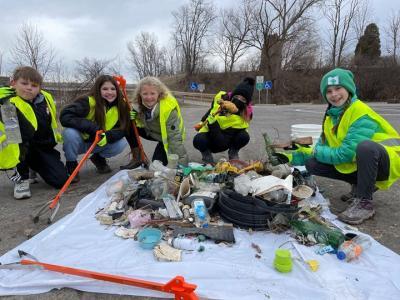Fifth and sixth grade students in Amy Boros’ environmental science club at Hull Prairie Intermediate School learn and live along the Perrysburg side of the Maumee River in Ohio, while Mike Dick’s seventh and eighth graders from Gateway Middle School hail from the opposite shoreline.
These two teachers participated in a GLRI-funded mentor program run by NOAA Sea Grant’s Center for Great Lakes Literacy. This particular teacher pairing was part of the Ohio Sea Grant’s mentor program called, The Greatest of the Great: A Marine Debris Workshop for Educators. The program provided participating teachers with marine debris-themed lessons and stewardship project guidance, as well as a customized “Litter Awareness Kit for Educators” or L.A.K.E. box.
After learning about marine debris, students were curious if recreational fishing activities during the annual walleye run affected how much marine debris was found along the shores of the Maumee River. They interviewed Mario Campos at Maumee Bait and Tackle to learn more about the walleye run, the worldwide audience attracted to walleye fishing in the area, and the economic benefits that this fishing event brings to the local community.
In the early spring before the fishing season, Boros and Dick’s students gathered on their respective sides of the river at six predetermined locations to conduct a ‘pre-walleye run flash sweep’ of marine debris. Students collected, sorted, and counted the various kinds of litter. This data served as a baseline for their study and was later compared to data collected during the second flash sweep at the same locations after the annual walleye run. They found a higher volume of trash and an increase in items related to fishing such as lures and bait containers after the walleye run, but not as great of an increase as they were expecting after having 10,000 anglers there for the event.
Boros and Dick’s students also increased litter awareness among younger elementary students using the children's literature provided in their L.A.K.E. Box. These read-aloud events enabled the older students to read to younger students and share their marine debris project with an eager audience.
The Center for Great Lakes Literacy, a Sea Grant-led network and partnership, promotes Great Lakes literacy among an engaged community of educators, scientists, residents, and students by encouraging hands-on experiences and basin-wide stewardship and providing educational resources and networking opportunities.


